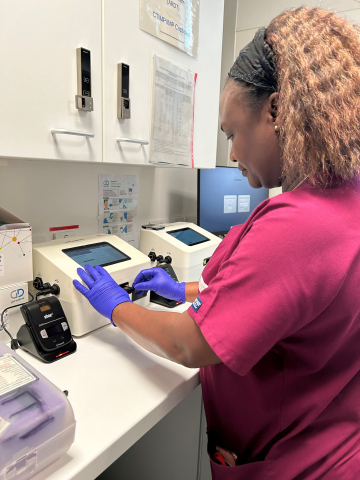Genedrive®
CYP2C19 ID Kit

The Genedrive® CYP2C19 ID Kit is a qualitative in vitro diagnostic (IVD) molecular test which identifies individuals carrying loss of function CYP2C19 alleles *2, *3, *4, *8, *35, and the gain of function CYP2C19 allele *17, which impact activity of CYP2C19 enzyme.
The Genedrive® CYP2C19 ID Kit is used in conjunction with the Genedrive® System to inform clinicians on an individual’s CYP2C19 genotype and corresponding CYP2C19 enzyme metaboliser status, as defined by CPIC guidelines.
The intended users of the Genedrive® CYP2C19 ID Kit are trained healthcare professionals, in near patient settings within a professional healthcare facility environment including hospitals and diagnostic laboratories.
100,000 people have a stroke each year in the UK alone. That’s 1 stroke every 5 minutes. Stroke is the fourth single leading cause of death in the UK, and causes 34,000 deaths annually, 1 every 15 minutes. 25% of strokes are recurrent.
National guidelines from NICE and Royal College of Physicians recommend that for ischaemic stroke or TIA (transient ischaemic attack) clopidogrel is administered with aspirin within 24hrs for secondary prevention of cardiovascular disease as the first line of treatment.
However, over 25% of the population are resistant to clopidogrel. This is caused by genetic variants of CYP2C19. There are many variants of the CYP2C19 gene, and these variants determine an individual’s metaboliser status, by influencing how effectively the CYP2C19 enzyme functions.
The CYP2C19 enzyme is thought to be involved in metabolising at least 10% of commonly prescribed drugs.
Rapid testing for clopidogrel resistance identifies those patients who need an alternative treatment.
Whilst CYP2C19 lab testing is available, it is unable to provide the results within the time-critical setting.
Patients: Reducing the risk of recurrent secondary events for stroke and cardiovascular patients.
Healthcare Professional: By empowering clinicians to test for patients CYP2C19 metaboliser status, enables them to make informed treatment decisions in a time-critical setting. Optimising treatment outcomes and delivering personalised medicine for their patients.
Health and Social Care Providers: Implementing rapid CYP2C19 genotyping to prevent secondary cardiovascular events has the potential to improve patient outcomes, release hospital bed stays and reduce social care burdens. The productivity gains from rapid testing more than exceed the monetary cost and time taken to implement the test.
Non-invasive sample collection by swabbing the patients inner cheek.
Submerge the buccal swab into the buffer solution to release the buccal cells.
Allow the sample to draw up by capillary action from the buffer solution and transfer to the assay.
Ensure the assay is fully dissolved into the liquid by flicking the cartridge downwards.
Log onto the Genedrive System and insert the cartridge to start the test.





CPIC guidelines recommend that patients with poor or intermediate CYP2C19 metaboliser status should be treated with an alternative treatment if possible.
NICE recommends using CYP2C19 genotype testing to assess if clopidogrel is a suitable antiplatelet for people who have just had an ischaemic stroke or transient ischaemic attack (TIA). Genedrive® CYP2C19 ID Kit is NICE’s preferred rapid testing platform.
A study published in the Journal of Molecular Diagnostics found that the Genedrive® CYP2C19 ID Kit delivers faster, more accurate results than a widely used laboratory test.
The Genedrive® CYP2C19 ID Kit is included in the SHTG Technology Assessment “Genotype testing to guide clopidogrel use after an ischaemic stroke or transient ischaemic attack (TIA)” which will be used to form an ANIA value case and will inform decision making on the roll out of CYP2C19 genotype testing in NHS Scotland.
A Scientific statement from the American Heart Association recommended that “A precision medicine approach based on CYP2C19 genetic testing is recommended.”
Interested in personalised antibiotic treatment? Learn how our MT-RNR1 pharmacogenetic test is being used to reduce the risk of antibiotic induced hearing loss in newborns.







